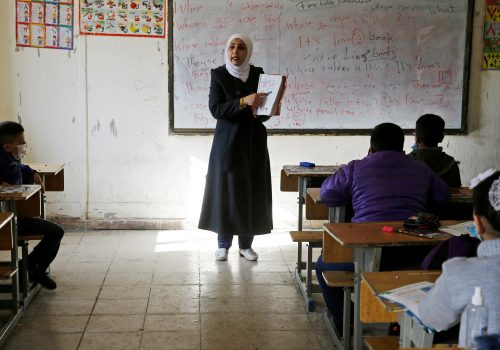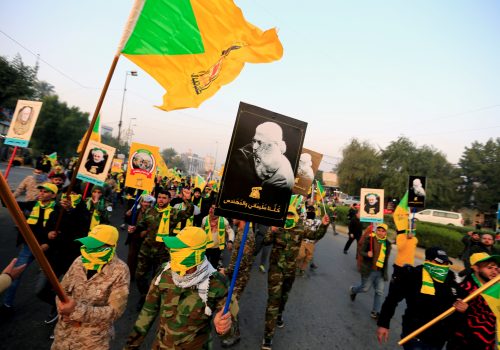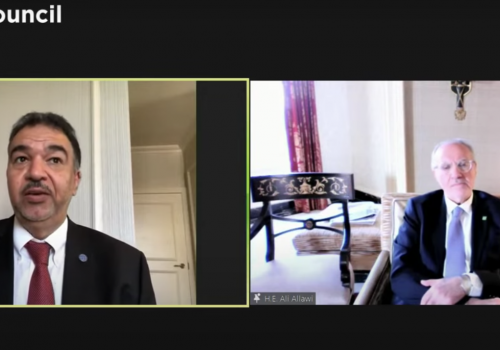Iraq is forming a new government. But getting there will be complicated.
The Iraqi Council of Representatives (COR), elected on October, 10 2021, was convened on January 9 to inaugurate the fifth legislative term. After a populist start from Shia political blocs and a violent dispute over the registration of the largest bloc in the COR, which sent the COR’s President Pro Tempore Mahmud al-Mashhadani to the hospital, the session was resumed under a new president, Khalid al-Darraji—which became grounds for a Supreme Court appeal.
The court issued a temporary injunction suspending the authorities of the newly elected speaker, Mohamed al-Halbousi and his two deputies. Until the Supreme Court adjudicated the two cases in a session scheduled for January 25, no legislative business could be conducted. However, the court has promised to make its ruling in a timely manner to avoid any disturbance of the constitutional timeline of appointing a president and, later, forming a cabinet. The Supreme Court ultimately rejected both cases and confirmed the constitutionality of the COR’s first session proceedings. Still, another related case needs adjudication regarding the validity of registering the largest bloc in the COR, which, according to the Iraqi Constitution, will have the right to nominate the next prime minister. This case was postponed to February 3, and while its fate won’t affect the constitutional deadlines, it may complicate the government formation and extend its time-frame if the court rules that the Sadrist Movement led by Muqtada al-Sadr isn’t the largest bloc in the COR.
Unsurprisingly, the last COR Speaker, Mohamed al-Halbousi, gained enough votes to retain his position and become the first two-term speaker in the post-2003 era. Halbousi’s reelection resulted from two arrangements: (1) his coordination with the Sadrist Movement, which won seventy-three seats in the parliamentary elections in October 2021, and the Kurdistan Democratic Party (KDP), which won thirty-one seats, to act as an inter-sectarian front, and, (2) more importantly, his success in rallying virtually all fifty-one Sunni votes behind his candidacy.
After the Supreme Court found no merit in the case brought by a fellow COR member calling for Halbousi’s disqualification, his position as the COR speaker was assured. The leading Sadrist, Hakim al-Zamili, also secured the first deputy speaker position and the second deputy speaker position went to Shakwan Abdulah from the KDP; both were elected during the COR’s first session on January 9. The position of COR speaker, which must traditionally be assigned to a Sunni Arab per the Iraqi extra-constitutional political arrangement, isn’t going to seal the distribution of other top political positions in light of Kurdish and Shia divisions.
Whoever the next president may be, his appointment must receive a green light from Masoud Barzani, the leader of the KDP, whose favorite candidate for the presidency may be held in the second round of voting, which requires a simple majority of the vote (the candidate must win two-thirds of the vote to become president from the first round). But a Sadr-Barzani-Halbousi front will be insurmountable in the second round. The COR announced a list of approved candidates that included the two main candidates: incumbent President Barham Salih, who is supported by the Patriotic Union of Kurdistan (PUK), and former Finance Minister Hoshyar Zebari, the KDP candidate.
The latest allotment of the COR second deputy speaker to the KDP should have cleared the way for the PUK to claim the Iraqi presidency for a candidate of their choice, with incumbent President Salih as the front runner. As the situation stands now, the two Kurdish parties are deeply divided on the presidency, with the PUK claiming its traditional control on the presidency in exchange for KDP control over the local government, the Kurdistan Regional Government, and the second position in the COR.
They have nominated the incumbent President Salih for a second term. Meanwhile, the KDP is playing a zero-sum game by claiming the presidency in addition to the deputy COR speaker, which they currently have. Their nominee is Hoshyar Zebari, who served as Iraq’s foreign minister and finance minister before he was impeached and removed from office by a COR vote in 2016 over accusations of wasting public funds, among other charges.
The government formation will be the main contest in the weeks ahead. The Shia political blocs, which are the majority and are to nominate the prime minister, are witnessing their worst political conditions since 2003, as their interpersonal differences seem virtually irreconcilable. If they fail to find a common cause between now and the election of the new Iraqi president, their divisions will characterize the next legislative term.
The Shia representation by one small faction won’t affect the Shia representation in the government, as the number of ministries for each ethno-sectarian group are fixed and the Shia ministries will go to the Shia faction that is part of the cross-sectarian coalition. However, the negative consequences of the Shia division will be on the outcome of the legislative process. Lacking the largest bloc status in the COR will remove Shia influence from the legislative agenda, which the speaker already overshadows. The new majority will decide the financial allocations, reconstruction decisions, services, and other federal decisions, where the Shia constitute a junior partner.
Iran, which refrained from overtly interfering in the post-election process until the COR leadership elections, made a swift position change and has recently put its finger on the scale. On January 16, the commander of the Quds Force, General Esmail Qaani, arrived in Iraq, visiting various Iraqi Shia leaders in an appeal to give up their current intra-Shia zero-sum game and form a Shia coalition with as many political blocs as possible to negotiate the government formation. His visit to Baghdad and Najaf didn’t bring the desired results, so he returned to Iraq for a second time on January 29 to take a different approach by asking Barzani to mediate between Sadr and his Shia opponents. Barzani sent a delegation—including the President of the Kurdistan Regional Government Nechirvan Barzani and COR Speaker Halbousi—to convince Sadr to embrace all Shia blocs in the upcoming government. Whether they succeeded in convincing both sides—particularly Muqtada al-Sadr—remains to be seen.
Sadr would like to increase his coalition by adding a number of his Shia competitors, but he is vehemently opposed to allying with former Prime Minister Nuri al-Maliki, whose State of Law coalition currently has thirty-eight seats in the COR. Maliki just managed to secure a renewal of his term as chairman of the Da’wa Party on January 15, and seems to have been able to keep his large non-Sadrist alliance together (until now), despite Sadr’s multiple attempts to court some of Maliki’s allies.
Whatever the outcome of the ongoing negotiations, the prospects of the next government will depend on the conditions of intra-Shia relations. While the departure from the status quo system—everyone is part of the government and no one is accountable—is a welcome development, it isn’t guaranteed to fix the broken political conditions of Iraq. A prime minister with a support system that consists of a minority among the Shia will be trapped between the hostility of his Shia opposition and the endless demands of his non-Shia allies. Meanwhile, a COR opposition bloc that is primarily made of one ethno-sectarian faction, namely the Shia, won’t provide the Iraqi political process the balance it badly needs. Such opposition will take a spoiler’s role without the tools to exercise robust and constructive oversight.
Dr. Abbas Kadhim is director of the Atlantic Council’s Iraq Initiative. Follow him on Twitter @DrAbbasKadhim.
Further reading
Mon, Jul 26, 2021
An “illiterate generation”—one of Iraq’s untold pandemic stories
MENASource By
The devastating impacts of COVID-19, coupled with years of spillover effects of violent conflict and extremism, have already proved to be detrimental to students whose education and future career ambitions already receive limited attention.
Mon, Oct 5, 2020
Can Kadhimi curb the influence of Iran-backed militias in Iraq?
MENASource By
Iraqi Prime Minister Mustafa al-Kadhimi needs to be more resolute about imposing non-military solutions to reduce the influence of rogue militias, a process he has already started.
Tue, Aug 3, 2021
Event Recap: A conversation with Iraqi Deputy Prime Minister and Finance Minister Ali Allawi
Event Recap By
On July 28, the Iraq Initiative hosted an event with H.E. Ali Allawi, Iraq’s Deputy Prime Minister and Finance Minister, to discuss the Iraqi delegation visit to the United States, the White Paper for Economic Reforms, and Iraqi economic and political developments.
Image: Iraq's newly elected for a second term as speaker of Parliament Mohammed al-Halbousi attends the parliament headquarters in Baghdad, January 9, 2022. Picture taken January 9, 2022. Iraqi Parliament Media Office/Handout via REUTERS


